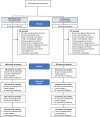Positive deviance for promoting dual-method contraceptive use among women in Uganda: a cluster randomised controlled trial
- PMID: 34408034
- PMCID: PMC8375745
- DOI: 10.1136/bmjopen-2020-046536
Positive deviance for promoting dual-method contraceptive use among women in Uganda: a cluster randomised controlled trial
Abstract
Objective: To examine the effects of a positive deviance intervention on dual-method contraceptive use among married or in-union women.
Design: Open-label cluster randomised controlled trial.
Setting: 20 health facilities in Mbarara District, Uganda.
Participants: 960 married or in-union women aged 18-49 years using a non-barrier modern contraceptive method.
Interventions: A combination of clinic-based and telephone-based counselling and a 1-day participatory workshop, which were developed based on a preliminary qualitative study of women practising dual-method contraception.
Primary outcome measure: Dual-method contraceptive use at the last sexual intercourse and its consistent use in the 2 months prior to each follow-up. These outcomes were measured based on participants' self-reports, and the effect of intervention was assessed using a mixed-effects logistic regression model.
Results: More women in the intervention group used dual-method contraception at the last sexual intercourse at 2 months (adjusted OR (AOR)=4.12; 95% CI 2.02 to 8.39) and 8 months (AOR=2.16; 95% CI 1.06 to 4.41) than in the control group. At 4 and 6 months, however, the proportion of dual-method contraceptive users was not significantly different between the two groups. Its consistent use was more prevalent in the intervention group than in the control group at 2 months (AOR=14.53; 95% CI 3.63 to 58.13), and this intervention effect lasted throughout the follow-up period.
Conclusions: The positive deviance intervention increased dual-method contraceptive use among women, and could be effective at reducing the dual risk of unintended pregnancies and HIV infections. This study demonstrated that the intervention targeting only women can change behaviours of couples to practise dual-method contraception. Because women using non-barrier modern contraceptives may be more reachable than men, interventions targeting such women should be recommended.
Trial registration number: UMIN000037065.
Keywords: HIV & AIDS; epidemiology; public health.
© Author(s) (or their employer(s)) 2021. Re-use permitted under CC BY-NC. No commercial re-use. See rights and permissions. Published by BMJ.
Conflict of interest statement
Competing interests: None declared.
Figures
References
-
- UNAIDS . UNAIDS data 2019, 2019. Available: https://www.unaids.org/sites/default/files/media_asset/2019-UNAIDS-data_... [Accessed 21 Mar 2020].
Publication types
MeSH terms
Substances
Associated data
LinkOut - more resources
Full Text Sources
Medical

